#cause it’s not really about their relationship just the framework around it
Text
I’m gonna preface this by saying I don’t like ACOTAR, I own the first two books and I honestly hate them, it does not spark joy for me but I simply can’t leave it alone because like R/WBY my brain has decided to fixate on all the ways it could have been good, and I honestly believe ACOTAR could have been great.
Now idk if I’m the first one to say this (I highly doubt it ik I’m v late to the series) but A Court of Thorns and Roses by far had the best and most believable romance in the series (not the controversial part) but it’s never really hit for me personally and I think I’ve figured out how to put the “why” into words.
ACOTAR is (supposedly) a retelling of Beauty and the Beast but it’s honestly not ever worked as one for me personally cause, and I’m gonna be comparing this mostly to the Disney version most everyone knows, the witch that curses the Beast at the beginning doesn’t/isn’t supposed to stick around but Amarantha does- she’s literally the main villain, there would be no story without her.
In the Disney version the witch tests the selfish Prince and when he fails she cursed him for it, Amarantha doesn’t do that- she curses Tamlin because essentially she didn’t like that he wouldn’t sleep with her.
And that changes everything about Feyre and Tamlin’s relationship cause the curse is supposed to be something that teaches the Beast a lesson- ie. beauty is only skin deep, not everything is what it seems, stop being a dick- but Tamlin doesn’t need to learn a lesson, that’s not why he was cursed, which changes how he and Feyre interact. Yeah he’s still gotta make her fall in love with him but it’s not really a self-reflection issue like the Disney version, it’s a fucked up game Amarantha’s making him play that his hearts not really in.
The scene where the Beast lets Belle go so she can rescue her father is the character growth moment for him, it shows how much influence Belle’s presence has had on him and when he sees how cruel he’s been by forcing her to stay with him. It’s the Beast learning to love someone more than himself, that love and compassion and care are always worth the effort even when it hurts.
And Tamlin doesn’t get that moment because he never needed it- he already knows what the Beast is supposed to learn.
Belle leaves because her town is going to throw the only family she has, her father whom she’d traded her freedom for, into an asylum cause no one will help him save Belle from the Beast. Feyre doesn’t get that because it’s Tamlin sending her away for her safety and besides there’s no way she would have gone back to save her family anyways Feyre is an inherently selfish character but that’s not what I’m trying to say rn.
Feyre comes back to save her love just like Belle does but it’s not an affirmation of belief for Tamlin like it is for the Beast, it’s almost exactly what Amarantha wants- another way to torment Tamlin and make sure he’s even more compliant than he was before once she has Feyre.
Feyre breaking the curse isn’t really a triumph of her love for Tamlin or a “reward” for his growth- it’s quite literally a tragedy for him since he has to watch her die after being tortured for months when he tried to save her from this exact situation.
I feel like I’m starting to repeat myself now so there it is ig- why Amarantha doesn’t work as a villain for me and how ACOTAR fails me as a Beauty and the Beast retelling. Feyre is a good “Belle” but Tamlin was never the “Beast”, he was always just her Prince.
#tamlin#this isn’t really specifically pro tamlin#but it’s also not not pro tamlin if you get what i’m saying#acotar critical#sjm critical#idk if I should tag this as f/eylin#cause it’s not really about their relationship just the framework around it#I did /not/ think I had this much to say about this topic#do not bring r/hysand in to this#I very purposefully didn’t mention him#I can’t fucking stand him#don’t clown on this post
1 note
·
View note
Note
hello! im just finishing up my read of structures of scientific revolutions, which has genuinely been very useful and shifted my understanding of science in a way being around people doing scientific research all day really didn't! i don't have a liberal arts education so i would love to get a sense of (a) what else of the philosophy / history of science canon is worth reading in the original (b) standard review papers or introductory textbooks and (c) critiques of the canon. i understand this is a big ask ofc, so feel free to point me to good depts / syllabi from good courses. thanks :)
yessss such a fun question >:) so, the thing that was so great about 'the structure of scientific revolutions', which i'm sure you've picked up on, is that kuhn pushed historians and philosophers of science to challenge the positivist model of science as a linearly progressive search to 'accumulate knowledge'. the idea of a 'paradigm shift' was itself a paradigm shift at the time; it was an early example of a language for talking about radical change in science without giving into the assumption that change necessarily = 'progress' (defined by national interests, mathematisation, and so forth). this is still an approach that's foundational to history and philosophy of science; it's now taken as so axiomatic that few academics even bother to gloss or defend it in monographs (which raises its own issue with public communication, lol).
where kuhn falls apart more (and this was typical for a philosopher of his era, training, and academic milieu) is in the fact that he never developed any kind of rigorous sociological analysis of science (despite alluding to such a thing being necessary) and you probably also noticed that he makes a few major leaps that indicate he's not fully committed to thinking through the relationship between science and politics. so for example, we might ask, can a paradigm shift ever occur for a reason other than a discovered 'anomaly' that the previous paradigm can't account for? for instance, how do political investments in science and scientific theories affect what's accepted as 'normal science' in a kuhnian sense? are there historical or present cases where a paradigm didn't change even though it persistently failed to explain certain empirical observations or data? what about the opposite, where a paradigm did change, but it wasn't necessarily or exclusively because the new paradigm was a 'better' explanation scientifically? how do we determine what makes an explanation 'better', anyway, especially given that kuhn himself was very much invested in moving beyond the naïve realist position? and on the more sociological side, we can raise issues like: say you're a scientist and you legitimately have discovered an 'anomaly'. how do you communicate that to other scientists? what mechanisms of knowledge production and publication enable you to circulate that information and to be taken seriously? what modes of communication must you use and what credentials or interpersonal connections must you have? what factors cause theories and discoveries to be taken more or less seriously, or adopted more or less quickly, besides just their 'scientific utility' (again, assuming we can even define such a thing)?
again, this is not to shit on kuhn, but to point out that both history and philosophy of science have had a lot of avenues to explore since his work. note that there are a few major disciplinary distinctions here, each with many sub-schools of thought. a 'science and technology studies' or STS program tends to be a mix of sociological and philosophical analysis of science, often with an emphasis on 'technoscience' and much less on historical analysis. a philosophy of science department will be anchored more firmly in the philosophical approach, so you'll find a lot of methodological critique, and a lot of scholarship that seeks to tackle current aporias in science using various philosophical frameworks. a history of science program is fundamentally just a sub-discipline of history, and scholarship in this area asks about the development of science over time, how various forms of thinking came into and out of favour, and so forth. often a department will do both history and philosophy of science (HPS). historians of medicine, technology, and mathematics will sometimes (for arcane scholastic reasons varying by field, training, and country) be anchored in departments of medicine / technology / mathematics, rather than with other faculty of histsci / HPS. but, increasingly in the anglosphere you'll see departments that cover history of science, technology, and mathematics (HSTM) together. obviously, all of these distinctions say more about professional qualifications and university bureaucracy than they do about the actual subject matter; in actuality, a good history of science should virtually always include attention to some philosophical and sociological dimensions, and vice versa.
anyway—reading recs:
there are two general reference texts i would recommend here if you just want to get some compilations of major / 'canonical' works in this field. both are edited volumes, so you can skip around in them as much as you want. both are also very limited in focus to, again, a very particular 'western canon' defined largely by trends in anglo academia over the past half-century or so.
philosophy of science: the central issues (1998 [2013], ed. martin curd & j. a. cover). this is an anthology of older readings in philsci. it's a good introduction to many of the methodological questions and problems that the field has grown around; most of these readings have little to no historical grounding and aren't pretending otherwise.
the cambridge history of science (8 vols., 2008–2020, gen. eds. david c. lindberg & ron numbers). no one reads this entire set because it's long as shit. however, each volume has its own temporal / topical focus, and the essays function as a crash-course in historical methodology in addition to whatever value you derive from the case studies in their own right. i like these vols much more than the curd & cover, but if you really want to dig into the philosophical issues and not the histories, curd & cover might be more fun.
besides those, here are some readings in histsci / philsci that i'd recommend if you're interested. for consistency i ordered these by publication date, but bolded a few i would recommend as actual starting points lol. again some of these focus on specific historical cases, but are also useful imo methodologically, regardless of how much you care about the specific topic being discussed.
Robert M. Young. 1969. "Malthus and the Evolutionists: The Common Context of Biological and Social Theory." Past & Present 43: 109–145.
David Bloor. 1976 [1991]. Knowledge and Social Imagery. Chicago: University of Chicago Press (here is a really useful extract that covers the main points of this text).
Ian Hacking. 1983. Representing and Intervening: Introductory Topics in the Philosophy of Natural Science. Cambridge: Cambridge University Press.
Steven Shapin. 1988. “Understanding the Merton Thesis.” Isis 79 (4): 594–605.
Steven Shapin and Simon Schaffer. 1989. Leviathan and the Air-Pump: Hobbes, Boyle, and the Experimental Life. Princeton, NJ: Princeton University Press.
Mario Biagioli. 1993. Galileo, Courtier: The Practice of Science in the Culture of Absolutism. Chicago: University of Chicago Press.
Bruno Latour. 1993. The Pasteurization of France. Translated by Alan Sheridan and John Law. Cambridge, MA: Harvard University Press.
Margaret W. Rossiter. 1993. “The Matthew Matilda Effect in Science.” Social Studies of Science 23 (2): 325–41.
Andrew Pickering. 1995. The Mangle of Practice. Chicago: University of Chicago Press.
Porter, Theodore M. Trust in Numbers: The Pursuit of Objectivity in Science and Public Life. Princeton University Press, 1996.
Peter Galison. 1997. “Trading Zone: Coordinating Action and Belief.” In The Science Studies Reader, edited by Mario Biagioli, 137–60. New York: Routledge.
Crosbie Smith. 1998. The Science of Energy: A Cultural History of Energy Physics in Victorian Britain. Chicago: University of Chicago Press.
Chambers, David Wade, and Richard Gillespie. “Locality in the History of Science: Colonial Science, Technoscience, and Indigenous Knowledge.” Osiris 15 (2000): 221–40.
Kuriyama, Shigehisa. The Expressiveness of the Body and the Divergence of Greek and Chinese Medicine. Zone Books, 2002.
Timothy Mitchell. 2002. Rule of Experts: Egypt, Techno-Politics, Modernity. Berkeley: University of California Press.
James A. Secord. 2003. Victorian Sensation: The Extraordinary Publication, Reception, and Secret Authorship of Vestiges of the Natural History of Creation. Chicago: University Of Chicago Press.
Sheila Jasanoff. 2006. “Biotechnology and Empire: The Global Power of Seeds and Science.” Osiris 21 (1): 273–92.
Murphy, Michelle. Sick Building Syndrome and the Problem of Uncertainty: Environmental Politics, Technoscience, and Women Workers. Duke University Press, 2006.
Kapil Raj. 2007. Relocating Modern Science: Circulation and the Construction of Knowledge in South Asia and Europe, 1650–1900. New York: Palgrave Macmillan.
Schiebinger, Londa L. Plants and Empire: Colonial Bioprospecting in the Atlantic World. Harvard University Press, 2007.
Galison, Peter. “Ten Problems in History and Philosophy of Science.” Isis 99, no. 1 (2008): 111–24.
Daston, Lorraine, and Peter Galison. Objectivity. Zone Books, 2010.
Dipesh Chakrabarty. 2011. “The Muddle of Modernity.” American Historical Review 116 (3): 663–75.
Forman, Paul. “On the Historical Forms of Knowledge Production and Curation: Modernity Entailed Disciplinarity, Postmodernity Entails Antidisciplinarity.” Osiris 27, no. 1 (2012): 56–97.
Ashworth, William J. 2014. "The British Industrial Revolution and the the Ideological Revolution: Science, Neoliberalism, and History." History of Science 52 (2): 178–199.
Mavhunga, Clapperton. 2014. Transient Workspaces: Technologies of Everyday Innovation in Zimbabwe. Cambridge, MA: MIT Press.
Lynn Nyhart. 2016. “Historiography of the History of Science.” In A Companion to the History of Science, edited by Bernard Lightman, 7–22. Chichester, UK: Wiley Blackwell.
Rana Hogarth. 2017. Medicalizing Blackness: Making Racial Difference in the Atlantic World, 1780–1840. Chapel Hill: University of North Carolina Press.
Suman Seth. 2018. Difference and Disease: Medicine, Race, and the Eighteenth-Century British Empire. Cambridge, UK: Cambridge University Press.
Aro Velmet. 2020. Pasteur's Empire: Bacteriology and Politics in France, its Colonies, and the World. Oxford: Oxford University Press.
i would also say, as a general rule, these books are generally all so well-known that there are very good book reviews and review essays on them, which you can find through jstor / your library's database. these can be invaluable both because your reading list would otherwise just mushroom out forever, and because a good review can help you decide whether you even need / want to sit down with the book itself in the first place. literally zero shame in reading an academic text secondhand via reviews.
399 notes
·
View notes
Text
My Top Shows 2023
Doing this at the last minute but here goes--the top 10 shows I watched in 2023!
*Note: I rate my shows on a letter scale cause I don't like narrowing it down to a specific number. (S-standout As-Strong Bs-Fine Cs-There's some problems Ds-ooof)
1. Oh No! Here Comes Trouble
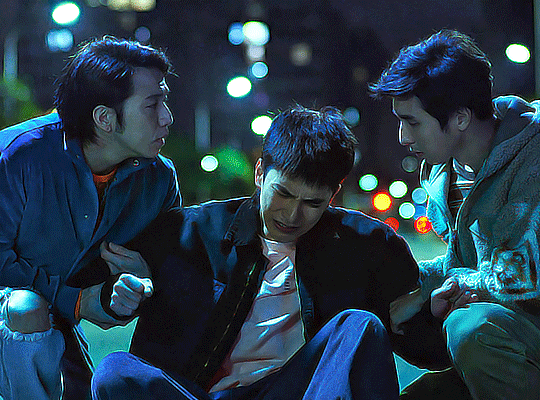
This one instantly became an all time favorite. It covers themes about grief and loss in a deeply empathetic and humanizing way along side the supernatural elements. I don't know if it's because I've experienced loss myself or because it's a universal experience, but I love shows like this that help you understand what it means to grieve and heal in a familiar yet new light. It reminded me a lot of Natsume Yuujinchou (another favorite) in that respect.
Aside from the larger themes, you have a distinct directing style, quirky sense of humor, well-rounded cast of characters, and excellent acting (the lead actor was also in Your Name Engraved Herein and he's just as standout here). In addition to all that, the show gives us a main trio of characters whose strengths are deliberately not their wits. This is used for humor but also to make more meaningful points about connection, empathy, and different ways of thinking (yes, I headcanon the main trio as neurodivergent).
Rating: S+
2. The Eighth Sense
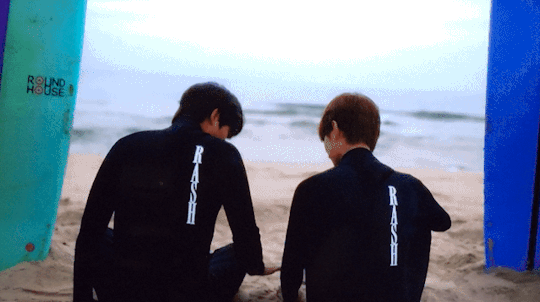
This show! Another piece that is deeply rooted in exploring trauma and loss. This time within the framework of a romance. I'm usually pretty hesitant with stories that bring disability into romance, especially mental illness. There's a tendency to lean into the idea that love cures all and other not so great tropes. The Eighth Sense does a great job balancing that line, giving us romantic beats without wading into them uncritically. In the end, healing and love are things we choose not something guaranteed, but there's still an immense hope in that. I'm an giant sucker for shows that tackle both queer and crip experiences with nuance and grace, and the Eighth Sense hit that mark for me (so much so it even had me writing a little meta). On top of that it has beautiful cinematography and visual choices.
Rating: S
3. Moonlight Chicken

A beautiful show all around! P'Aof constantly knocks it out of the park with every show he directs, but I felt particularly strong about Moonlight Chicken. I adore the way it centers on themes of home and community. It even inspired some meta and a bit of personal reflection for me on what it means to choose home as someone who is queer and disabled. The show gives us the messiness that comes with navigating new and old relationships and somehow also the simplicity of it all. And of course, the show includes a Deaf character and handles his story with nuance and clear care.
Rating: S
4. Shadow
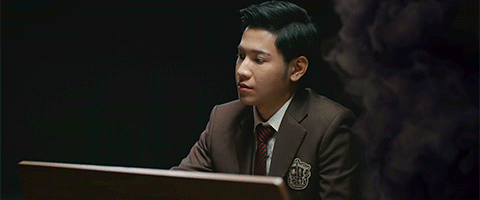
Singto, Fluke, and Fiat in a queer horror show--sign me up! It wasn't as scary as I expected, more psychological (which is good because I am so picky about what types of horror are too much for me vs what I enjoy). I loved the way the show played with time and reality and drew upon various religious practices to create a unique atmosphere. I also adored the attention to small details that make the piece ripe for analysis. I will probably be eyeing clocks and tech in many shows to come. It's also a show that is bringing up themes about queerness, mental illness, domestic violence, and historical trauma. I'm continually drawn to pieces that are queer and crip, so I suppose it's no surprise that this one drew me in too.
I know this show was divisive, about as many people thought it stuck the landing as didn't. I happen to land in the former category. I adore media that makes me stop and think, and given the amount of meta the show had/has me writing, I'd say it well and truly tickled my brain. The show didn't always go where I most wanted or expected but I think that challenged me even more to really think about what the show might be trying to do (my thoughts on that here, spoilers though).
Rating: S
5. Our Dining Table
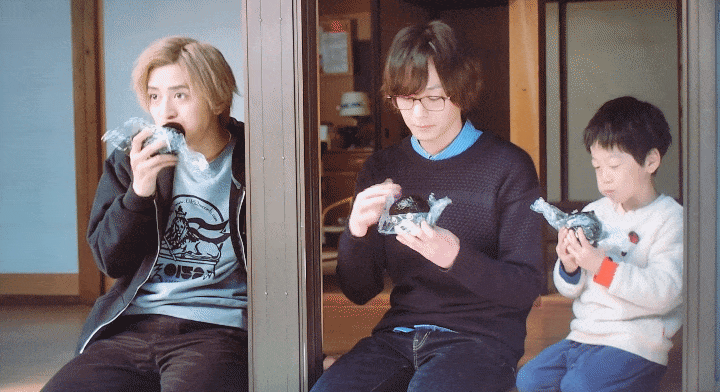
Japan does a lot of things well, but I'm particularly fond of their slice-of-life. Our Dining Table fits right in there with food and found family at the center. It's warm and cute, but has a depth beyond it's soft exterior, delving into loss, loneliness, and what it means to be fully seen by those around us. All of this tied up in a queer bow. It was easily the show I was most excited to watch each week when it was airing.
Rating: S
6. Mysterious Lotus Casebook

Another one I fell in love with this year! While it has plenty of tropes, cutting through the core of all of this is the growing friendship between the main trio, especially between Li Lian Hua and Fang Duo Bing. Their relationship and personal growth as characters was really beautiful to watch, on top of it just being a fun show with a great balance of humor and drama. Plus Fang Duo Bing's mom 😍
Rating: S
7. One Room Angel
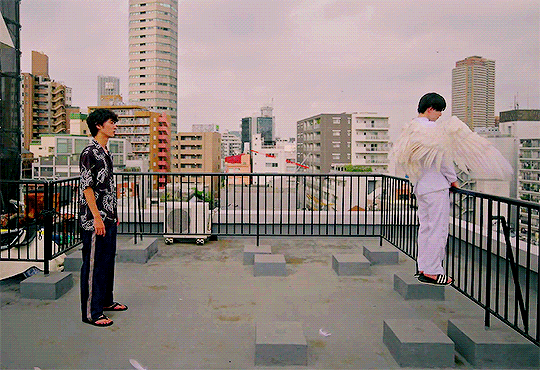
Another solid entry out of Japan. As much as I love Japan's bright slice-of-life offerings like Our Dining Table, they also excel at stories that don't shy away from heavy or complex emotional themes. And I'm noticing as I tackle this post that I really resonate with heavy themes. One Room Angel has it's lighter moments and own quirky humor. But it also tackles depression and suicide as it explores the journey of finding enough connection and meaning in life to keep moving forward.
Rating: S
8. I Feel You Linger in the Air
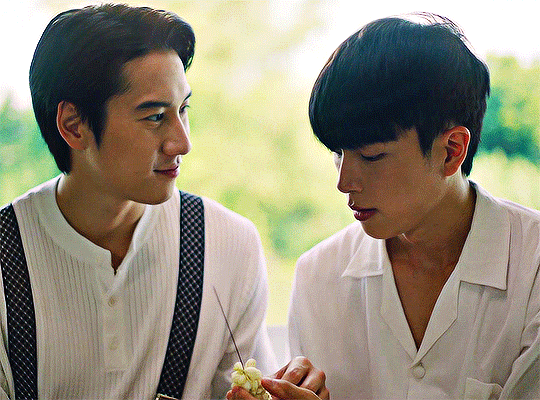
I Feel You Linger in the Air was such a beautiful show! I'm so happy we got a historical thai bl this year and that it was so so lovely. I really liked last year's To Sir With Love but it does have it's Lakorn/soap style that is a bit more of an obstacle for me. IFYLITA certainly has it's drama, but it feels more tightly drawn. Throw in a little time travel and beautiful love scenes and it was a delight to watch.
Rating: S
9. My Beautiful Man S2, Eternal
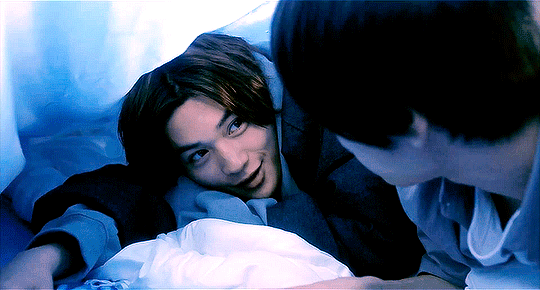
When I watched the first season of My Beautiful Man I liked it but wasn't exactly sold. I read a bit of meta from the community which changed my tune a bit. But it wasn't until watching season 2 and Eternal that something really clicked. I immediately went back and watched season 1 after finishing the film and oh boy did I fall in love. Not only do S2 and Eternal give us great character growth and forward motion to Hira and Kiyoi's relationship, and they feel like a natural expansion of the first season in the best way possible. What can I say, I love the whole series!
Rating: A+
10. Kiseki: Dear to Me
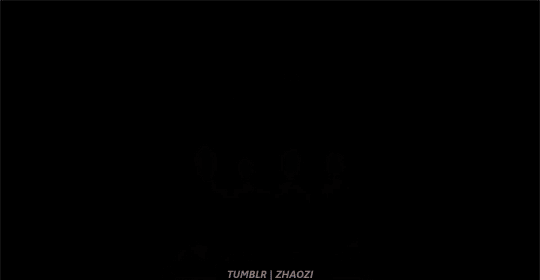
Kiseki: Dear to Me feels like an outlier to me. It's hard for me to put my finger on just what made it click for me, but I was so into it when it was airing. I recognize that plot wise this show is a bit of a mess, but at the same time it hit something just right in my brain. Perhaps it was the emotional intimacy the actors portrayed? They did a fantastic job drawing me in. Apart from that I couldn't take my eyes off of Ai Di's impeccable fashion choices, and the many many cameos were quite fun.
Rating: A+ YMMV
A few close contenders:
My School President (S) *split airing 22' and 23'
Tokyo in April Is... (A+)
Laws of Attraction (A)
Bed Friend (A)
The End of the World with You (A)
Me, My Husband, and My Husband's Boyfriend (A)
If it's with You (A)
Our Dating Sim (A)
Love Tractor (A)
The Warp Effect (A) *split airing 22' and 23'
The New Employee (A) *split airing 22' and 23'
La Pluie (A-)
Midnight Museum (A-)
#i completely flaked on doing one for 22#but this year I made it just in time#80% of these are queer pieces#my top shows#my top shows 23#my posts#bl series#oh no! here comes trouble#the eighth sense#moonlight chicken#shadow the series#our dining table#mysterious lotus casebook#one room angel#i feel you linger in the air#my beautiful man#utsukushii kare#my beautiful man 2#my beautiful man eternal#kiseki dear to me
55 notes
·
View notes
Text
A personal rant on Nesta and Elain’s relationship and how I feel about it
TW: tbh this is a very personal rant for me given that my perspective on life informs how I see these characters (mostly Elain) neglect, abuse, parentification, fucked up family dynamics basically
For framework of this post, I'm anti sjm, anti IC, and pro character nuance even when it comes to the IC
Yknow, reading ACOSF was actually so difficult as someone who really wanted to see more nuance in Nesta and Elain’s relationship
I hate that Feyre actually used Elain’s packing of Nesta’s old home behind her back as a weapon against her, that it reinforced Nesta’s isolation
I hate that we never really understand what happened between Elain and Nesta before this moment, just that somehow someway Nesta was at fault and Elain was ‘justly’ hurt by Nesta, I hate that we, as readers, never even get the possibility to decide for ourselves
I hate that when they do finally talk to each other it’s this:
Elain: “I know the circumstances got your coming here were awful, Nesta, but it doesn’t mean you need to be so miserable about it.” (In reference to Nesta literally being confined to the House of Wind after getting evicted unjustly by the IC, in which Elain was willingly used against Nesta)
Nesta: “You tell yourself there’s nothing that could have been done because it’s unbearable to think that you could have saved him, if you’d only deigned to show up a few minutes earlier.” (In reference to Elain not being able to save her father and implicitly shaming her for it, noted, this is also a response to the above which matters)
Like, the fuck??
Where was the build up to this moment? Where was the reason?
For one, it’s so gross of Elain to invalidate what Nesta is going through, and is also gross of Nesta to place that blame on Elain
It’s just fucking gross all around
And I would have been okay with it, if it was fucking resolved by the end of that huge ass book, but it’s not
They don’t even talk about it, just a small joke and a truce at that ball, and they don’t even talk about the actual painful shit they said to each other
A personal note on this topic:
I’m gonna be honest, I like Elain (to some extent) even though we don’t know too much about her. All I know are these things, she’s someone who was taken care of from a young age, and relied on Nesta and Feyre basically like how a dependent would.
And tbh, out of all the sisters, despite relating to all of them in some way, I feel like what Elain’s going through is connected to my life more personally despite it not being written from her pov. Elain has all the typical signs of a golden child. Loved and cared for and seen as a the best child but also infantilized. She’s so fucking infantilized at every fucking turn.
(TW: A personal note about abuse and neglect) I had the strange dynamic of being both the scapegoat and the golden child to my mother, whenever it suited her, I was shown off like a trophy to my extended family but also was treated like the poison that was causing my parents’ marriage to fail.
As someone who grew up disabled, not able to walk, I also relate to that depression Papa Archeron inevitably has, despite whatever we want to say about canon and neglect
Elain likely took care of him, while both Feyre and Nesta took care of her
Tbh, the sisters’ dynamic is messy and complicated, and I’m not gonna trust sjm to write it well at all
But growing up as a disabled person, not being able to make choices for myself in my own care, I can understand where Elain is coming from
From the beginning by Feyre, Elain is casted in the light of childlike ignorance and while not entirely blamed for it, is also never confronted about it. Elain is doesn’t know that she’s not doing enough for Feyre and this likely forms resentment with Feyre later on. That’s understandable.
As a kid, I grew up stable enough to have what I wanted and then had to live through poverty when we lost our house. The transition in mindset is one I wasn’t one I immediately took to. I didn’t understand why I couldn’t go out to eat, no one ever sat down to explain our money situation, and even though we were definitely going through it, it was expected of me to understand that we couldn’t do certain things
So I would innocently ask for things out of our budget and ask for expensive food without realizing, and would get blamed for the guilt my mother felt for not being able to provide for me as she wanted to. I learned to never ask for what I wanted, and it’s still something I'm learning to deal with whenever I buy something or need help
I mention this all to say that Elain does similar things in the first acotar book. She asks for something out of the budget and she asks for things without malice, merely because she wants something and thinks Feyre can give it to her
Feyre never says that they can't afford it or that she needs to buy new boots for herself, she doesn't explain this to Elain and Elain is never given the chance to say, "Oh, I didn't realize."
She's not allowed a moment of growth, she's stagnated in her childlike responses to things both because of the narrative sjm wanted to tell and because of Elain's dynamic with her family.
I don't even think Elain understands money and how it works (neither does sjm but that's a different point). It's possible she sees the deer, the fur, something new and something that they could sell in the market for, and thinks they might have enough for something she wants
It's a mistake I made so commonly in my childhood, that Feyre's resentment actually breaks my heart
That's what makes Nesta's protectiveness over Elain feel both like care and shackles
(Something sjm tried to address but did so fucking poorly, like usual)
Later on, when their wealth is restored, Elain goes back to the familiar easily, likely because she never truly got to have the mental transition both Nesta and Feyre had (and her father was actively hoping for this to happen so he was likely excited about this as much as Elain)
I also want to point out want happened in ACOSF between Elain and Nesta. I mentioned in another post the Elain likely (mostly her unconscious inner child) sees Nesta as a mother figure. That Nesta likely was the one that took care of Elain when they were younger more than her mother. Nesta likely gave Elain the kindness of her mother, the attention of her father, and Feyre was too young at this point
So I think it's understandable why she's lashing out in ACOSF to Nesta, because it's that realization that the person who's been taking care of you your whole life, the one who you can go to and lean on and not be judged by, can no longer take care of you
To some extent, Elain realizing Nesta is going through hell, she has to face losing another parental figure and her first reaction is likely to cling onto that relationship even though it's unhealthy for both of them
Its like a child asking why their parent can't take of them, isn't that their job?? Except Nesta isn't Elain's mother and never should have been put in that position
Elain reacts in indignation and anger and hurt because that's what a child does, and Elain is going through this now because she's never had the chance to before, now she's being forced to
She has to grow up and she's petulantly digging her heels in
On the note of ACOSF, in the scene where she and Nesta talk (where I pulled those quotes from the beginning from), Nesta is not in the right head space at all to deal with Elain and what she's going through
Nesta is just point blank not able to do it. Mentally, she already feels like someone undeserving of love and is a horrible person. She's deteriorating and Elain just comes up and acts like she's not dying inside.
(Fuck sjm btw for doing this to Nesta)
In fact, Elain can see that Nesta is miserable but says she should basically be handling it with more grace. Which, is fucked, but it is something that is commonly told to literally anyone going through shit and by people not willing to be sympathetic to that
(It could almost be internalized misogyny because women are expected to deal with things gracefully or 'in a manner befitting a lady' but that's another discussion for another day)
What I want to point out in this discussion is how Nesta interacts with Elain because we honestly can't for sure know Elain's POV (despite this whole post projecting on her because sjm doesn’t give us enough for me to satisfactorily understand the character she’s writing after nearly FIVE books but whatever. Skill issue I guess)
A note on how they view each other and how they talk about each other in ACOSF:
This is honestly like?? Just a thing, but the implication is that Elain is pampered here, she wouldn't do this or that. It's framed as a bad thing, especially since at this point the stairs are representative of Nesta’s freedom being held hostage and Elain just gets to come and leave without consequence.
From Nesta's POV:
Someone had brought Elain here, since there was no way in hell she had climbed those ten thousand steps.
She stopped a few feet away. As if holding herself back from the embrace she might have given.
Like Nesta was some sort of disease-ridden leper.
Like, again, this comes from a distorted view Nesta has of herself, not helped by the IC at all. It's likely that Elain just know how to bridge the gap between them that has formed.
Elain had been the ghost then, too thin, with her thoughts turned inward.
Somehow Nesta had become the ghost.
Worse than a ghost. A wraith, whose rage and hunger were bottomless, eternal.
Elain had only needed time to adjust. But Nesta knew she herself needed more than that.
It was always that way between them: Elain, sweet and oblivious, and Nesta, the snarling wolf at her side, poised to shred anyone who threatened her.
In ACOSF, Nesta and Elain have switched places from ACOMAF when Elain was honestly going through it. Regardless, both of their mental states have been used to gain high ground with each other in this fandom and I'm like, not going to do that, that's not the point.
Rather this comes back to my previous point. Nesta has had to take care of Elain, likely as a mother would. It's the resulting parentification Nesta has endured.
This is also... Like yes, needing more or less time to adjust in general, especially to a traumatic situation, is morally neutral. What makes me pause of the self woe is me of Nesta saying she's worse than Elain in nearly every way. This is a result of her mental state. But it's also not helpful to either herself OR Elain. This instead puts Elain on a pedestal, in her own box.
WHICH IS INTERESTING BECAUSE BECAUSE BECAUSE: going hc now but, with how Nesta was groomed by her own mother, it wouldn't surprise me if Nesta also 'parents' in this way towards Elain. Except Elain gets to be everything Nesta didn't get to be in the eyes of her mother; perfect, beautiful, gentle, demure, a lady. Elain, to Nesta, deals with her own grief more respectably than Nesta, which is likely an external expectation placed on her from a young age.
There is also the idea that Nesta has more patience and gentleness with others than herself.
Elain had accepted his death as inevitable. She hadn't bothered to fight for him, as if he hadn't been worth the effort, precisely as Nesta herself knew she herself wasn't worth the effort.
Another comparison Nesta makes between herself and Elain. Except there's also this element of protection to it. Often, Nesta is willing to be that 'wolf' to protect Elain, the innocent and oblivious. But again, this also places expectations on Elain, that box her in.
"...Go back to Feyre and your little garden."
Again, with how Nesta essentially views Elain's grieving process. But instead, I'd say this comes across more as a twisted mess of Nesta's own unresolved feelings towards her father and also equating herself as him. He was their father, and in many ways Nesta played that role for Elain. When she hates her father, I suppose in some ways, she is also hating herself in this moment.
The unsaid said here is also Nesta's survivor's guilt. I think it's not far fetched to say that (presumably) just like Elain, she wanted to save her father and she wanted to 'be early' to help him.
"She's not getting any better. She's not even trying."
This is also likely Nesta acknowledging that they've split. In ACOTAR through ACOWAR, it has always been Nesta and Elain, Elain and Nesta. But in ACOSF, Nesta feels betrayed by Elain because of Feyre's actions. People hate the IC and Rhysand for Nesta's imprisonment, but this is also a product of Feyre using her authority and deciding Nesta's bodily autonomy with her own 'goodwill' in mind.
And Elain famously has always had a little garden. But it's also an isolation from hurt and pain, it's a place of comfort, and it's always been a place where Elain belongs. This time, Nesta is saying that Elain belongs there (despite whatever Elaim could want).
This could also reflect Nesta’s bitterness about being trapped.
Nesta shot to her feet. "No."
Now, this is what Elain says about Nesta. Which tbh, is understandable for her POV. This is after Nesta says those quoted words to her. But this is also ultimately a result of no one acknowledging the pain and honestly disgusting thing they've done to Nesta. Elain expects that Nesta will get better in an environment that's actively worsening her mental state. The reasons why Nesta does 'get better' is always connected to something outside of the House of Wind with Gwyn and Emerie. The library, despite being close, is not the same as the HoW, so it makes sense that Nesta would go there to escape.
Elain remained in the doorway, her face pale but her expression harder than Nesta had ever seen it. "You do not decide what I can and cannot do, Nesta."
... "You will not go looking for it."
I think this is honestly this crux of their dynamic. Nesta is the 'mother' and Elain is the 'child' despite them actually being sisters. Nesta tells Elain what to do, as a parent would would their 'power' over a child. Except Elain is rejecting this.
This is... a dynamic that is honestly just done a major disservice by sjm. Neither of them acknowledge anything in a meaningful manner and none of them resolve anything at all. ACOSF establishes dynamic poorly and does an even poor job of doing honestly anything about it. Nesta instead is beat down so much that she just breaks down and accepts it. And Elain doesn't grow in any way either. Instead, because sjm and her characters do not actually acknowledge the reality of the conflicts they have, Elain just comes off as more childish and spoiled, which is like, also horrible for her character. A clown show is what this whole series is.
#anti sjm#elain archeron#nesta archeron#pro elain#pro nesta#pro elain archeron#pro nesta archeron#papa archeron
36 notes
·
View notes
Text
Bernard the Elf x Reader
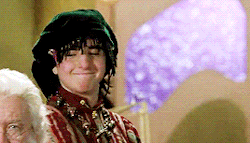
So this is a bullet point sort of imagine/headcanons that I’m also using as the framework of a fanfiction I’m currently writing because there is not enough work with everyone’s favorite head elf, Bernard. (This is for the first Santa Clause movie and some slight changes to the timeline of the movie just because I can.)
- You’re Scott’s kid and Charlie’s older sibling and met him for the first time when you got roped into adventures on Christmas Eve in 1994. (You’re an eighth grader at this point.)
- That night when you were still up because you had seen the lack of Christmas cheer in your dad’s house and wanted to still make it special for your little brother. So you had been in your room cutting snowflakes and making garland to make the morning magical for him.
- After the divorce you had taken on a sort of parental role for Charlie because of the instability the pair of you had being caught in the middle of a neverending custody battle. So when you had arrived at the North Pole you were extremely protective of Charlie. In response Bernard had to convince you that you were both safe and more importantly no harm was going to come to Charlie while you were there.
- For the most part of that first day (night?) you met Bernard, you were looking after Charlie as the pair of you were taken around the workshop for food, etc. and only really talked somewhat normally late in the night when your father and brother were asleep.
- Bernard of course was still awake due to the stress of that Christmas, the whole new Santa and the Santa Clause not being taken well by your dad. So you ran into him while you were exploring that workshop looking for some paper and scissors to continue on the decorations you started back at home for Charlie.
- He was confused why you were still up and explained that you were on the search for paper and scissors to finish your surprise for Charlie. Bernard being an elf offered to help you finish your surprise for Charlie.
- Bernard was easily a lot better than you at it but ensured you that yours were not bad at all. He was secretly impressed at your artistic abilities as you were a human after all and had no were near as much experience as he did. You explained that every year at Nutcracker rehearsals you and the other kids would make these crafts every year decorating your dressing rooms.
- Bernard shared about what it was like being head elf and how Christmases through the years had been for him with the different Santas.
- You shared how life was since the divorce, how Christmases used to be celebrated before it happened and your strong opinion that Nutcracker music is definitely categorized as Christmas music.
- The pair of you talked until sunrise and he sent both you and your family back home.
- When you woke up in your bed you were positive it was a dream but when you saw your dad in the pajamas and Charlie began talking your ears off about the previous night you knew it was real. The final piece of proof was the decoration the two of you had worked on being all over the family room and your stocking being stuffed with a wooden nutcracker.
- As the year continued on you got wrapped up in school, ballet and shielding Charlie from the worsening relationship between your parents. You also continually encouraged Charlie to not talk about what happened that last Christmas because it just added fuel to fire of the newest battle in what you deemed the custody war.
- However the final straw was when the boxes of the list to your dad’s house caused you to trip, break your ankle, benching you from dance until it healed. Your mom and Neal used this as the final piece of evidence of how Scott’s actions had not only created a mentally/emotionally unsafe environment for your brother and you but also a physically unsafe environment. As crazy it was all and the questioning from the judge full custody was awarded to your Mom and Neal.
- The next months are mainly you just being horribly frustrated, depressed and mad at the world. Neal of course encourages you to talk and feel your feelings (as well intended as he is) the day that would have been your Nutcracker auditions you finally snap and hobble up to your room. You see the nutcracker and end up tossing it across the room in frustration because it’s a reminder of both how everything has changed again and how your injury is not allowing you to participate in the Nutcracker this year.
- After the nutcracker clatters to the ground you regret it immediately seeing that it has broken. You gathered up the pieces and began to fix him as best as you can.
- Charlie sees you in your room when you’re crying quietly as you attempt to fix your nutcracker. He immediately dug out the snowglobe from Bernard that he had hidden away from mom and Neal. Charlie quietly slips into your room and sets the snow globe on your desk as a gesture to make you feel better.
- Since the snowglobe is magical and allows communication Bernard was able to find out what’s happening and that’s the second time you see him.
- You felt extremely guilty and embarrassed when you saw him with the broken nutcracker sprawled out on your desk and puffy eyes. He’s confused on how the nutcracker had gotten into the state it was now in and you admitted to your regretted outburst.
- Bernard quietly listened and made no comment on your outburst but directed all his attention to the broken nutcracker. “It’s not a bad beginning to a repair job,” he told you as he looked over its current state. Bernard pushed his way onto the desk chair with you and silently began fixing the nutcracker. “There, all better,” he said as he placed the fixed nutcracker back on your desk.
- That’s when you both noticed how close you both were causing Bernard to stand up abruptly causing you to fall off the chair.
- The third time you see Bernard is when your dad comes to say goodbye to Charlie and yourself before going up to the North Pole. You end up going with Charlie and your dad to the North Pole.
- The next month or so you help around the workshop.
- Most of the time Bernard ends up assigning you to areas that need a little extra help and conveniently he is often the one that needs an extra hand as it draws closer to Christmas.
- You helping is mostly listening to him talk about the inner workings of the workshop and offering potential solutions. Sometimes they’re good solutions and sometimes they’re not but you’re a good sounding board for him and his work.
- On Christmas Eve you joined your dad and brother on the delivery. When your dad gets taken to jail, Charlie stuck on the roof, you had come into the house and were now stuck being relentlessly questioned by your mom and Neal.
- They gave up and decided that they will have to take you in the next morning for psychiatric help. Neal is making you a sandwich when your dad and Charlie come back.
- Just like the movie your mom and Neal come to the realization that your dad truly had become Santa. Bernard appeared and ends up taking the sandwich that Neal had been making for you.
- After Bernard explained the whole snowglobe to Charlie he took his scarf and wrapped it around you. Bernard thanked you for helping him the past month around the workshop and soon disappeared in a poof.
To Be Continued in Part 2 (which will focus on the second movie)
-> https://at.tumblr.com/lume7/bernard-the-elf-x-reader-part-2/avn7osf72kwt
#the santa clause#bernard the elf#bernard the elf imagine#bernard the elf x reader#Bernard the elf x gn!reader#i can't believe i did this#yet here it is#and there will be more
294 notes
·
View notes
Text
Hello, I am going to discuss my thoughts on content/trigger warnings as someone living with OCD. I am absolutely open to good faith engagement and discussion on this topic.
Having some thoughts on the idea that adding trigger warnings somehow ultimately harms the person with the trigger. They absolutely can create an easy tool to obsessively control your access to the topics/to avoid them, but I’ve always felt it should be the potentially triggered person’s decision on what they were ready to do about it. Uncontrolled exposure is just as capable of causing obsession as is avoidance, in my opinion.
I think of the (terrible telephone retelling of a) case I heard about while discovering recounts of actual lived experiences with OCD.
—The following example discusses intrusive thoughts about domestic violence.—
A woman had an obsession with being was afraid of hitting her boyfriend. Her compulsion was that she would have to hold her arms stiffly by her side. She recognized this as OCD and sought exposure response prevention. Her therapist told her to try and ignore the compulsion, or potentially do the opposite. The woman became so obsessed with healing she forced herself to keep her hands away from her sides (almost obsessively) and constantly checked whether or not she “still wanted to hit him.” In the end, the ERP just became entangled with her obsessions.
It takes so much strength to face these types of problems and practice the mindfulness and grace with yourself to recognize it. It’s something you really need to be ready for because it’s going to take a lot of effort to do the hard thing when the easy thing is right there.
How can we claim it’s best to “force” exposure on someone else? How can we go around vigilante therapising people we have deemed too ill to do it on their own (or just be left alone)?
This is not to say that anyone is bad if they can’t or don’t want to tag things. More just my thoughts about how pushback against that idea can swing too hard into trying to prove not tagging was morality correct.
Some articles that articulate so much of my experience with OCD:
Having No Cure for OCD Is the Cure
Help! I Have OCD About What’s OCD
In the spirit of bodily autonomy, I think we all deserve agency in our lives no matter how “incompetent” other people may think we are. When you’re ready, you’re ready. There’s no healing to be had sitting around thinking you’re broken or lazy or whatever for not being ready to change. We all owe each other the kindness to do what we can in good faith, too.
I started doing too much table setting in the tags, so I’ll put it under a read more, lol.
I recognize that this isn’t very radically (in the abolition vs reform sense) anti-psychiatry, and I do have a complicated relationship with that idea. I recognize that I have a good deal of privilege (particularly among people with more stigmatized/less understood “disorders”) but this framework is the only one I’ve ever been able to access that gives me any insight into myself at all. That isn’t something everyone can afford to do in several senses.
As a physically disabled person, I just connect my experiences with chronic illness and mental illness (which I think can fall under the umbrella of chronic on its own) more and more these days. What truly was the difference between not being able to do something out of pain versus anxiety? Our brains are organs, too. Our thoughts are chemical and hormonal, too.
One of the fondest memories I have of coming to terms with disability was explaining my experience with an autoimmune condition to a bipolar friend, and he replied that we were “chronic illness buddies.” And I felt so understood as someone who has suffered with various types of anxieties for their entire waking life.
#actually ocd#antipsychiatry#i guess maybe this falls in that category? idk#mental health#intrusive thoughts#ocd#as an OCD haver I lean a lot on stuff like the CBT methods used in ERP#just in the first article I link the author (therapist with OCD) talks about getting dumped by the book (DSM)#and it just hits home rlly hard#I have more a take what you want and leave the rest approach to it#ocd tag
34 notes
·
View notes
Note
So I want to preface this with the fact that I’m being completely genuine here, there’s no gotcha, and that I’ve been an artist of some flavor basically my whole life but mostly I’m a writer of fiction. And. You have your against representation tag. And I’m coming around on the idea that Representation Doesn’t matter all that much, Actually, but jaws and birth of a nation and other works like them are still extant and have/had a measurable effect on our culture. So, that said, combined with that Kurt Vonnegut quote about the Vietnam War and the pie, is there any conclusion I can come to other than “art can’t help, it can only harm”? Is art at best irrelevant to societal struggles, and at worst, can only set us back?
help not birth of a nation AND kurt vonnegut!!
hashtag against representation is definitely not arguing that art is inherently either irrelevant or antithetical to social change; it is not even primarily making a claim about art so much as it is posting against a particular mode of critical reception which posits that art is only successful or acceptable insofar as it portrays a world which is either a mirror to ours and/or aspirational in some way. within this framework, art is pretty strictly utilitarian, and that only insofar as it manages to either reveal something already extant about our world or, more saliently, to set a moral example for how we ought to behave. i really disagree with the idea that art needs to accomplish either of those goals in order to adequately justify its existence, and i think that idea ends up retroactively making some claims about the relationship between art and life that i also disagree with.
namely, i would push back on the implicit claim that audiences can't be trusted with work that is dark or complex or portrays people behaving in ways that are unpalatable, that such work if left to proliferate unchecked would somehow exert nefarious influence over viewers or readers to the point of causing people to confuse depiction or exploration or critical inquiry for straightforward endorsement which of course they would be powerless to resist. idk it goes back to earlier posts about the idea that consuming #problematic media corrupts your soul and rubs off its problematicness on you whereas consuming moral media that has #positive representation conversely purifies you and serves as concrete evidence of your fundamentally good character. which in and of itself is just the latest iteration of the ever-recurring moral panic about the power of art to exert undue influence over us and bypass our ability to reason; see my pinned post for an example from an earlier historical period lol.
i think the vonnegut point you reference is helpful here insofar as he reminds us that while politically charged art can and does influence hearts and minds, it is also not a substitute for taking political action in other forms; representation paradigms and politics would have us conflate the two, such that just watching the right kinds of shows comes to stand in for being politically engaged. and while it may be meaningful or moving for people to see fictional worlds that are diverse along a variety of axes, i don't buy the idea that that automatically translates into structural change in the world we live in, where people can't afford rent or access healthcare or etc.
the point, at least as i see it, is that like. pushing for fictional diversity in and of itself is not going to save us; it blurs the lines between fiction and reality such that people begin to needlessly try and police or purify others' fiction consumption and production habits because they think it tells them something about those same people's political commitments, and imo is also often a drain on collective energy that could be more effectively deployed elsewhere. it's less that Representation Doesn't Matter and more that representation is literally just representation, no more and no less, and certainly not the lever by which we can most effectively bring about social change.
again that's not to say that art has no place in politics or political movements, but i think the relationship is much more complicated than make art where people are good to each other -> people will be good to each other in real life. and even if that WERE the case, it still wouldn’t obligate people to exclusively produce positive or progressive art.
85 notes
·
View notes
Text
So one of the things about TUA that I find so interesting is how each of the characters reacts to the abuse of Hargreeves in a different way. It’s very close to an exploration of the full spectrum of reactions. (Season 1 in particular is a kind of study of this but I’m not going to go into Leonard here. I’m also not going to go into Lila or the abusive relationship employment of the Commission, but I have thought about those things as well.)
Edit: Kind of long so more under the cut. Slipped and marked it mature by accident >.<
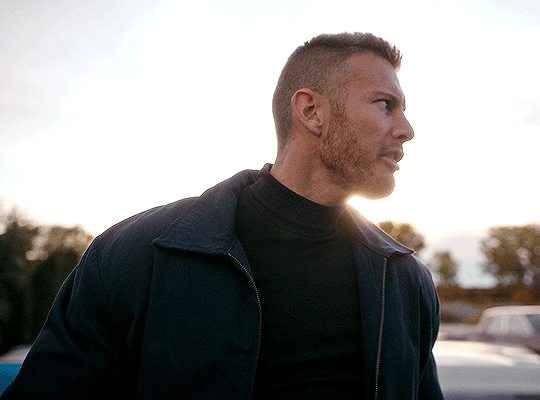
Luther
Luther isn’t the leader, like he thinks. He’s the enforcer. And he’s the enforcer because he is so convinced that the failure is with him, with them, and not their father. When he can no longer follow his father’s will in s2, he finds a new powerful man to enforce for—in a very literal way.
Luther, especially in s1-2, is a difficult character to like. He’s an ass, he’s always convinced he’s right, and he’s always wheedling to be heard, to be obeyed, to be listened to. And he is the cause of much of his siblings’ suffering.
It’s quite sad from another angle, though. He seeks out another powerful man in s2 because he very much does not have any internalized framework of his own—of right and wrong, or even really of likes and dislikes.
Once he sets that need for control down, he’s mostly just this goofy, slouchy guy. He doesn’t know what’s happening, going to happen, or what’s right. He just takes things as they come.
As a comparison to a character many of us find much more appealing, Dean Winchester is also an enforcer. The difference is, one of John’s directives is to protect Sammy, and his own reaction is in that same direction, like many abused kids. Protect your sibling. Which creates this deeply codependent dynamic that we see throughout the show. (They also have a bit of golden child / scapegoat going on, which we’ll come back around to.)
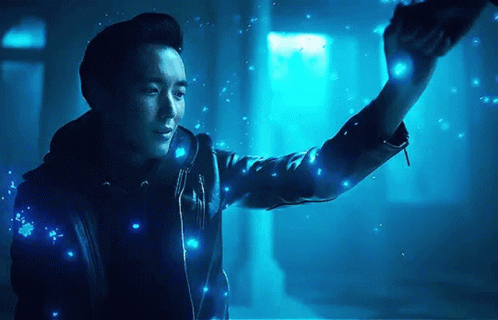
Ben
The one who dies. I’m not going to say too much about this beyond sometimes that, too, is a consequence of abuse.

Allison
The one who perpetuates the cycle. I really like this because I don’t fully like the adage ‘hurt people hurt people.’ Hargreeves is an abuser because he feels justified in his abuse.
Allison does it because she didn’t grow up with any other skills, and because it feels safe. Her first acts of abuse are with her daughter, because she is a frustrated and overwhelmed parent with no other skills to manage her own emotions. But she does well in therapy, and we see her leveraging those skills to push back against ingrained family dynamics.
But whenever she is lost and afraid in the world, she resorts to abuse to get what she wants. And more and more through the story, we see her abandoning compassion and emotional regulation in favor of taking her feelings out on others. Because she decides it’s justified.
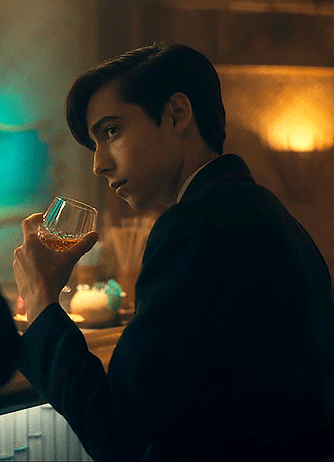
Five
The runaway. Five rebels to escape the abuse, and gets re-traumatized out in the world. But he also steals his autonomy back and crafts his own completely-formed identity. Look. That’s not to say that the dude doesn’t have issues in spades. But he can talk to Hargreeves, interact with him at any stage in the game, and not have it shake his identity to the core. Both the trauma that he chooses and his own choice for responsibility and autonomy determines who Five becomes.
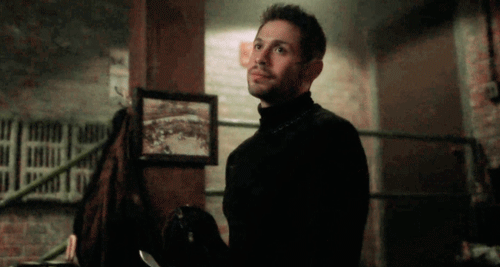
Diego
There’s a sequence from House, MD that I feel like sums up Diego’s reaction to the abuse quite nicely. House is late to his dad’s funeral and he explains to Wilson how punishing his (abusive) father was about punctuality. He explains that he is deliberately careless around time because he didn’t want to make his father’s issues HIS issues. And Wilson, incredulous, shoots back with, “Thereby MAKING it your issue!”
Yeah. That’s Diego. He defines himself in opposition to Hargreeves. And he even says so explicitly. He’s all about fighting crime, “the right way.” But he defines himself so in opposition to authority (and to people in general) that he gets kicked out of the police force and burns his first romantic relationship to ashes. He just can’t stop fighting.

Klaus
The addict. Addiction is a common response to abuse. And Klaus is a full-blown addict. A thief, willing to do anything and everything for his next score. He’ll injure himself, terrorize others, go dumpster diving, steal, defraud. Really there are no limits to what he’ll do. And yet we always feel he’s a sunshiney sweetheart right from the start. Even so, the “anything to score to escape my demons” is a keen literalization of the addiction response to abuse.
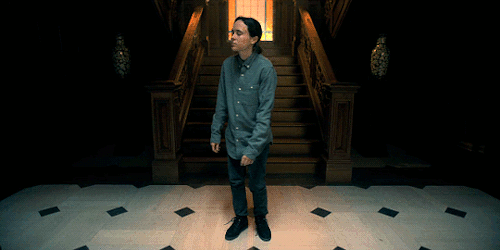
Viktor
The scapegoat
“Everything is always your fault.” This is the one who gets blamed for the family’s problems, who gets punished and punished and ignored. This is the one who is always in the wrong. And Viktor is such a great character in season 1 & 2 for this because he’s both reactions to that. He is the explosive anger, the rage and indignity. And he’s the one broken by any means necessary, heaped with family blame, with no sense of what he wants or who he is. And also, in s1, exceptionally vulnerable to an abuser masquerading as everything he ever wanted.
I just. It’s so multifaceted. It’s such a good exploration of abuse and this is only one sliver of that. TUA has its flaws, and I thought s3 was such a mixed bag, but this is one piece they just NAILED.
11 notes
·
View notes
Text
lounges across a chair with a cup of tea. you know, i could do a little bit of aroblogging. for old time's sake. for new time's sake? 'cause there's a thought i've been rotating for a bit, something i've been wanting to knit into a piece of poetry - maybe some day, just not today. it's something i've not seen discussed very much, or at all, really - probably because i haven't been looking in the right spaces, or looking at all. probably because it's going to make me sound kind of pretentious or arrogant, but i'm used to that, so:
it's just - the strangeness of being an aroace person people keep falling in love with. i think "kind of person people keep falling in love with" is just something that happens if you're a person who's comfortable with yourself, or when you have a lot of interpersonal relationships, or if you just share much of yourself with other people. just, having contact with people around you in some way. feelings happen when they have the opportunity to grow! i don't know how it works! but i've been that person, at least a little bit, you know? it kind of happened as i grew older and grew into myself. it was very confusing, too, because like okay, i like myself, but i'm not necessarily expecing others to like me, it's great when they do but i wasn't banking on it! what!!!!
it's very sweet and all but it also means - facing the conundrum: do i Want this, or do i just Want to Want it, or am i just Curious about what it would mean to Have it? i've Tried, and i still don't know. personally, i'm glad for having tried, because otherwise i'd be asking myself for the rest of my life what it would be like to Try, and that's a me thing. i'm not immune to the yearning! you'd think being aroace would make you immune to the Yearning. i want my money back?
it also means - that no, i'm not aroace "because i can't get some," i promise, but it's not an argument i should have to make in the first place. it's such a strange spiral of an accusation, because in the world i live in there's nothing shameful about being single or a virgin regardless of orientation. to me it's a relief to not have to have sex with another person, but apparently i live in a society and in that society that's such a fundamentally alien notion i'm impossible to relate to. sorry about that.
it also means - i have to be the person who rejects people, and there's always so many stories about being the person who gets rejected, and there's mountains of sad songs and sympathy for being the Rejected One, the Lonely One, and of course, learning to handle rejection with grace is an important, painful thing. never got many saturday morning cartoon lessons in how to reject, though. not just in romantic pursuits, but in general. always running the treadmill of the scarcity mindset and You Must Never Hurt Anyone For Good Reason and there i was, crying my eyes out at my childhood friend's trampoline in the sunset telling him i'm sorry i can't love him back that way, and there i am, replying to the kindest social media DMs with i'm sorry i can't be your friend but it's not something i can force - i know it hurts, and who would we be if it didn't hurt, and if i didn't hurt you i would have to be the one to carry the pain. it's hard to make relatable, i guess?
always the fucking relatability! i know a lot of people can't Relate. because we're young and lonely and yearning and starved, because we're social animals, even if we're fiercely independent or enjoy the solitude. not to make assumptions! i know we're all different and want different things from life! but there's not a lot of frameworks for how to fill our cups when every beverage we're offered is the wrong flavor. i know coke makes my teeth feel weird but there's so, so many commercials for it, and it looks tasty in all of them, and i haven't had a drink in forever, how do i not crave it? i'll still show up to the party asking for a water and everyone is gonna give me the weird looks. am i sure? am i sure? i'm tired of feeling like a wrecking ball, i say. uhhh okay idk what that is about, they'll say, but water? that's a little boring, isn't it? we have so much soda, though. there's coke, coke, and vanilla coke.
just tap water, please and thank you. hope i don't ruin your party.
#the metaphor got away from me a bit#is there a coherent thesis? fuck if i know#too long for twitter#aroace tag#i know the food/drink metaphors are tiring but as a person who doesnt drink alcohol nor coffee. it just. happens So Much#scandinavians get weird when you dont drink coffee.
126 notes
·
View notes
Text
i can't stop thinking about these bits from it devours
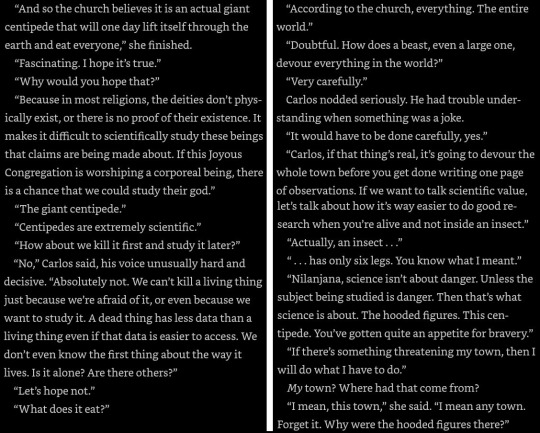
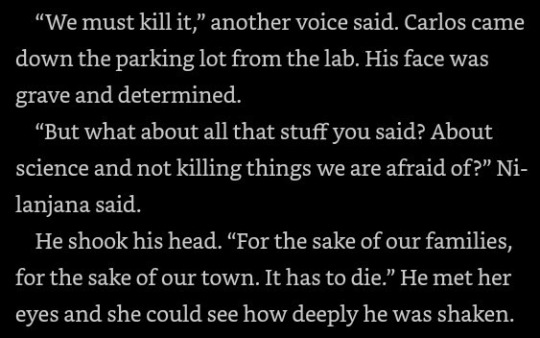
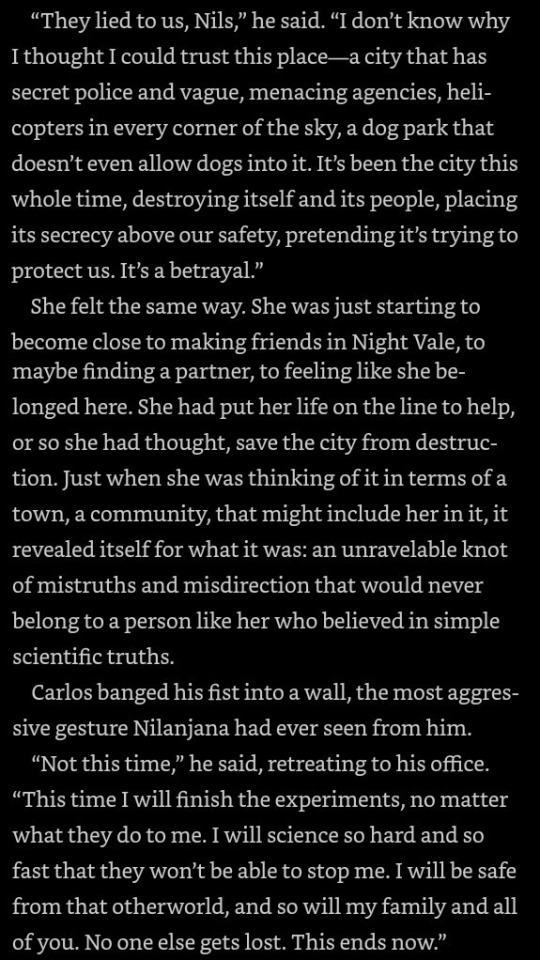
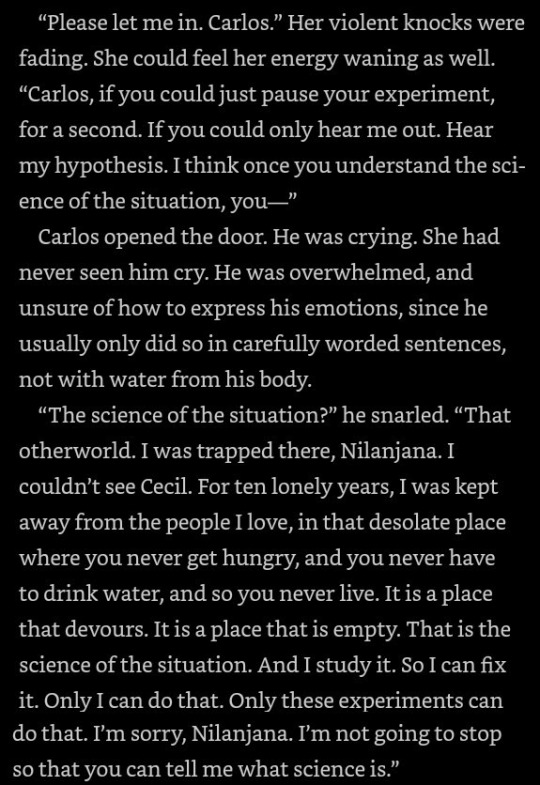
in relation to the newest episode, about the different types of science and the relationship between science and the logic of night vale
i think both nilanjana and carlos express janet lubelle's values in these scenes and give us a richer idea of what the culture of the university of what it is is like.
nilanjana spends the entirety of it devours feeling like an outsider even after living in night vale for four years. her arc is not only about learning to make a home but also about expanding her view of what science can be. she's the only member of carlos' team doing what we, the audience, would describe as real science. luisa and mark do science within the rules of the wtnv universe, things that are nonsense with no practical value or application except to be a deus ex machina later in the story. nilanjana says their type of science is what wins awards and grants, but she does her work because "She simply wanted to study the nature of the world." who does that sound like? the reason nilanjana doesn't feel at home in night vale is because she's operating on the rules of the real world rather than acclimating to the rules of night vale. carlos even tells her: "Maybe it’s not about them accepting you. Maybe you have to accept them first.”
carlos spends the story single-mindedly devoted to his experiment. carlos has a moral code that structures his work, focusing on doing good and minimizing harm. he doesn't want to kill the centipede until he feels he has to, specifically to protect his family. (it's interesting when nilanjana wants to kill it to protect the town he avoids that conversation, and it's not until janice is threatened that he changes his mind, something to consider further later.) but carlos also spends the story shifting blame around, first he blames the city then the church then the city again. it's only after everything's said and done he's able to see that it was him all along causing harm. it was him and his science that was threatening the town. but carlos is unable to see his own hypocrisy, saying of the city counsel that its "placing its secrecy above our safety, pretending it’s trying to protect us" - carlos, aren't you pretending you're trying to protect people when really you're trying to bring what's secret into the light? and who does THAT sound like? carlos believes that anything that can be studied can be fixed and anything that can be fixed can be made safe.
night vale is an "unravelable knot of mistruths and misdirection" that can never be fully understood and appreciated by people who believe "in simple scientific truths." carlos said the first step towards him accepting night vale was accepting their world view: "But it wasn’t that he didn’t see the things that I saw, he just interpreted them differently. I was afraid of him and all the people of Night Vale because of that." this is something nilanjana struggled to do and something lubelle seems uninterested in doing.
it's been said before that it's likely carlos left for night vale in the first place because he didn't fit in at the university and was open to investigating a rumor. he built his own team, and given that luisa and mark seemingly adapted easily to the rules of wtnv's universe and nilanjana eventually came around too they were also a bit atypical for university staff
however, while the team was able to adjust to the town using carlos' ethical standards as a framework, carlos isn't without his own university cultural holdover. carlos is an avid workaholic who believes in scientific import above all else. his perfect self and perfect reality as express in the condos liveshow was: "endless rows of Erlenmeyer flasks, and every one held a liquid, and all of the liquids were bubbling, and before each one was a notebook of numbers, and above was a dial with more numbers. I saw all of this, and I understood—I need to get to those flasks. Each liquid was bubbling. There were numbers. I’m going into the condo. The condo is perfect. It is perfect, and I understand." a reality in which he can endlessly do science and, most importantly, understand
carlos' value of do no harm is the only difference between him and lubelle and, ostensibly, the university as a whole. he has the same drive to study and understand that lubelle has, but stopped his experimentation once he realized he was the one destroying the town. even so, it took getting to that point for him to stop even refusing to hear nilanjana's perceptive about what science should be.
60 notes
·
View notes
Text
There's something strange about the development of the relationship among Louis, Claudia and Lestat that has struck me since episode 4 and I couldn't really articulate it.
Bear with me this is a bit long.
The inciting incident that sets the stage for Claudia's more contentious relationship with Lestat is Charlie's death. You can see there was tension and Louis was the favourite even before that, but we never see Lestat be this cruel with her up until that point. And it seems a bit out of nowhere in retrospect. Not that he isn't capable of it, because of course he is. But it got me wondering what got him there. Why the hell was he that damn angry?
There could be many answers of course. Maybe they wanted to portray that he just doesn't care about her and that he is projecting his traumas on her by "teaching" her this "lesson". But, imo, that seems a bit inconsistent with his behaviour before and after. Moreover the way he acts in the scene where Claudia brings Charlie's body home is almost - I don't know how to pinpoint it exactly, but almost exasperated. Like he has been stewing on this particular issue for a bit and biting his tongue about it. Even the glance he shoots to Louis over Claudia's head, really reads strongly as a pretty pissed "I told you so". It just doesn't look like a sudden burst of anger to me.
And it got me thinking that, from what we know: 1) Louis was somewhat aware about Charlie (he knew about the flowers and he must have been suspicious about Claudia shutting him out of her mind for the first time over them); 2) I can't for the life of me believe that Louis and Lestat, having known that Claudia was involved with a human, wouldn't be worried about it.
Maybe (almost definitely) I'm reading too much into this, but I think that Louis and Lestat knew about Charlie. They fought about what to do. Lestat probably advocated for some strong action, at the very least to forbid Claudia to see him again. Louis agreed it was dangerous, but he already felt guilty enough robbing Claudia of her life, he probably wanted her to feel a degree of normalcy. I can see this being an ugly fight. And I can see this being the beginning of the famous bursting of the illusion of happiness, with Lestat being confronted with the reality that he was not Louis priority anymore. But I think Lestat relented, because the danger if Claudia did kill Charlie was not that much in the end and it would do well to her and Louis to learn to listen to him more in the future. And then what happened happened.
I know this is a reach and there's no proof about this. Probably never will be. But the point is that - even if Lestat can be horrible and cruel to the people he loves - he rarely is outside the framework of his own fucked-up triggers. Him being extremely pissed out of indignation and petty exasperation and wanting to reassert his power and also make Claudia pay for the strife she caused between him and Louis just rings more true to me than him going off the rails at random. It's not like when Claudia was dropping bodies left and right, what she did with Charlie was not that dangerous for their safety in New Orleans. Reread in this light, the whole scene just feels more organic to me, less disjointed. Otherwise I always feel like I am missing a bit, like there are gaps.
All of this is of course not to excuse Lestat - I just think this is yet again Louis not showing us part of the narrative to justify himself. In loving Claudia despite her unnatural existence. And in allowing Claudia's hate for Lestat to run unchecked when - once again - he was maybe more of an active participant in her misery than he let on. And Lestat was maybe - once again - the unwilling accomplice that got the burnt of it all because his reactions are so all-around awful that he just makes it very easy.
#this show is giving me brainworms#with this unreliable narrator shit#I am going to have to rewatch every scene 30 times from 30 different point of views#interview with the vampire#iwtv#iwtv spoilers
68 notes
·
View notes
Text
The problem with luck spells (verifiability and energy cost)
This is in response to an anon ask about why luck spells weren't working. I am afraid my inbox ate the message during my hiatus and I can't remember the specifics. Sorry, Anon. Hopefully these ramblings will help:
"Luck" spells suck, don't do 'em.
(Now that I've made that inflammatory statement, let me try to justify it)
Generally speaking when we want to do magic that effects physical results - as in, something in the world around us changes, not just an inner enlightenment thing - we run into a few immediate problems.
2 problems when it comes to "magic that affects my physical circumstances" are #1 verifiability, and #2 energy cost vs effectiveness.
Verifiability can be described as our ability to point towards a reliable chain of cause and effect between our casting and the results. For example, a neighbor harasses me every day for 3 months. I cast a binding spell, and a week later he stops harassing me and never resumes. This is a relatively clear chain of cause and effect. If I cast the same spell over and over again to get people to leave me alone, and their behaviors suddenly stop, that creates an even stronger verification over time.
Verifiability is important because, well, when we do magic most of us want to know that it actually works. So maybe nobody is really harassing me and I've got no enemies, but I cast a preemptive spell to bind anyone who has it out for me. I already didn't have problems and I still don't have problems - that's not really verifiable, is it?
Luck spells - as in, spells generally meant to just place you in the way of fortuitous happenstance - carry the same problem. Even if your magic worked, how would you know?
All of us experience happenstance all of the time. On the bell curve of life, most of it is average, some of it is a little better or worse than average, and very little happenstance is extremely good or bad.
"Good luck" can be anything from me not dropping my bead organizer when I otherwise would have, to hitting 10% more green lights on my way home, to finding money that I lost last week.
The problem is that good luck is just happenstance, and the closer you want to get your happenstance to the extreme good end of the bell curve, the harder and harder you have to work.
I think that when people cast good luck spells, they have a nebulous concept that it's supposed to drop money in their lap, or a beautiful person will proposition them, or something. But I really think people who cast "luck spells" don't actually have anything in mind, because if they knew what they wanted they'd just cast a specific spell to get that instead. And because there are no clear expectations of what is supposed to happen, there is no clear way to verify these spells ever work.
So when luck spells don't appear to work, I think a large part is verifiability. If luck spells aren't working, a good start is to decide what you want and just cast something more specific for that instead. Because then we get to #2!
It is a common adage, and one that I believe in, that magic takes the path of least resistance. Let's stack together a metaphor:
Your spell framework is a bucket. The amount of power it can hold depends on its construction.
The power you raise is like water in the bucket. A huge and powerful spell format can be filled with only a tiny bit of power, while a terrible bucket will be tiny and spill power out no matter how much you raise.
So imagine we have a perfectly good luck spell and its appropriately filled with water -- where does that water go?
Since luck spells are usually targeted at everything, a little bit of water goes to every part of your life. Imagine the water is poured into little aqueducts. You've got an aqueduct for money, relationships, your school or job, your garden, your hobbies, all kinds of stuff. We don't all have the same aqueducts, but you get the idea :)
Even if we raise up a huge amount of energy for our spell, only a little bit is going to make it into each aqueduct, and none of it is going to get very far. The power is just divided up into too many areas.
(Now it's not as if all the water goes into each "aqueduct" equally - this is what blockages are about)
This is the reason why very vague spell focuses don't serve us. The energy just goes in too many directions. You could be raising enough energy to make a hell of a debt clearing spell, but then just let it all evaporate out in a lot of different unrelated puddles.
Now imagine the whole spell was built up to something specific, like quick cash, and all the energy was poured directly into your cash aqueduct. That water is going a heck of a lot further than if you just splashed it about in the middle of your life.
In general, if any part of your life is resistant to manifestation - like, all relationship spells - you would likely be better served by an unblocking or way-clearing spell instead. But if you haven't tried any actual targeted spells to get something specific, I'd start there - I just don't think general luck spells are a good enough concept to devote time and energy into.
331 notes
·
View notes
Note
In regards to full bodily autonomy, how do you relate that in regards to anti vaxxers? Or other such cases where the line between harming oneself and harming others seems to become blurred
first of all i've already said i think the bodily autonomy defence of anti vaxx actions is a bit of a smokescreen. there are a lot of different things going on here: first and foremost ableism (both the flagrant disregard for the lives of disabled people---which is really just a reproduction of capitalist valorisation of human lives exclusively on the basis of the profit they can generate via working---and the fear of vaccine injury that leads people to actually place themselves at more risk from the diseases themselves because they think they're avoiding adverse effects, whether real or of the wakefield autism conspiracy variety). this is also an issue that we should expect to see given the relationship between public health authorities and the state, as well as the ongoing legacy of deeply unethical and harmful behaviour from physicians, medical guilds, and so forth. reluctance to trust medical authorities is not irrational or even unwise, even though in the case of vaccines it can lead to pretty tragic and harmful outcomes. i also think that sometimes low vaccination rates are automatically assumed to be the result of vaccine hesitancy, but this isn't always true. for example, in a country without paid time off or universal health care, accessing a vaccine (and recovering from any mild symptoms it may cause) is not always simple; all the messaging in the world doesn't fix this type of materialist access issue.
but to answer your question within the framework proffered: it is generally understood that bodily autonomy does not entitle you to harm other people. if someone wanted to remain unvaccinated and literally never interact with another human being, i truly would not care. the issue is that in the case of vaccination, simply being around others when you are unvaccinated is the action that carries a risk of harm to them. the same way that living in society with others places limits on my ability to swing a loaded handgun in any direction i please, or to shout "fire" in public places, it also means i can no longer walk around unvaccinated with impunity. we accept in other cases that if we want to be around other people, we must sometimes live by certain codes of conduct. i think the framing of vaccine refusal as an autonomy issue is hiding the fact that people who genuinely refuse to get vaccinated either don't care about spreading infections or don't think that refusing vaccines will actually affect the spread of such infections. which, again, circles back to issues of ableism (disregard for vulnerable people they're around) or misunderstanding (sometimes wilful) of epidemiological claims made by experts and institutions.
68 notes
·
View notes
Note
(Been re-watching Reboot, love your work.) Just have to say [dubious writing and/or Trojan abilities aside] that it really is both terrifying and disturbingly intimate how Megabyte is the cause of all of Dot's deepest emotional scars and yet also knows /exactly what she (thinks) she wants/ in a partner. Your thoughts?
Hi, sorry I took a few days to answer this, it's the kind of ask I like to mull over and smirk about. I apologise if I don't actually answer the question but I'll talk around it and see where it leads.
To start with, I think you've hit on the element of the series which is at the crux of my MegaDot fanfic and fanart - that ultimately Megabyte is highly perceptive about Dot's wants, and possibly even needs, and yet, in contrast, and in line with his nature, he knows, and at many times has infiltrated, her faults and weaknesses.
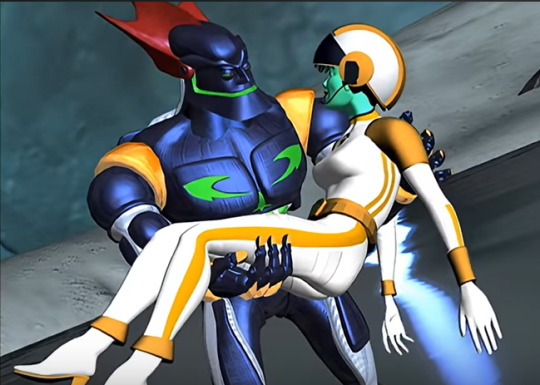
I will over-simplify things but bear with me...
The thing about Megabyte and Dot is that arguably, at a basic level, they are the same character. The parallels are I think particularly sharp in series one and again at the start of series 3, where they are at first competitive, astute and highly ambitious businessmen/women (series 1 - plus that nice lil scene in series 2 where Dot asks Megabyte to loan his ABCs - the fact she has him in her "phone book" always tickles me) OR later on, as the show develops and progresses, they are both sharp-minded strategists and commanders (series 3, where both characters are much darker and more ruthless).


If you strip away their morals, their appearance, their gender, etc, etc, and look at their basic motives and drives, whether that be in business and trade, or in war and conquest, you have the same mould. It's beautifully done; the same character framework but in totaly contrasting lights.
And because ReBoot was the elite in terms of 90's children's television in terms of its writing, depth and structure, these parallels are apparent in their relationship and actions. One of the best ones, which was pointed out by the blog @vidwindow years ago, is a subtle one which I honestly didn't pick up on at first (goes to show that this show has so many layers so that each re-watch is a revelation... but I digress):
In the first episode of series 3, "To Mend and Defend", Megabyte salvages Hex and with a wicked grin and that thick sinister tone of his, tells Herr Doktor "I want her to have the best treatment, understand? The best." Cue evil laugh. Later in the same episode, Frisket gets hurt in the zombie game and when they get out, Dot asks the doctors to make sure Frisket gets "the best treatment possible. The best". Heartfelt, caring and true.
The contrast is startling and it is meant to be - Megabyte rebuilding his sister for enslavement, no qualms about her pain or suffering, versus Dot saving her brother's dog and companion, who is as much a family member to her as any of the sprites she shares her life with. It shows the same thought pattern but cast alternately in selfishness and selflessness. So very nicely done. Same coin, different sides. Bravo, ReBoot creators.
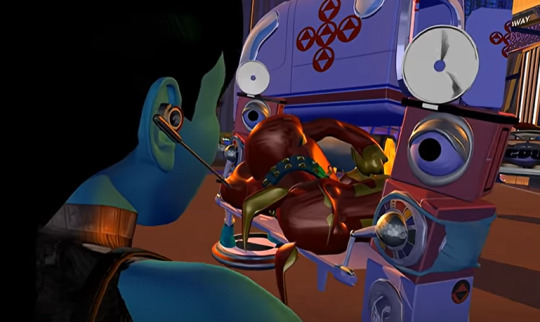

So being so similar, understanding Dot for Megabyte isn't really a problem. Of course he knows what her weaknesses are, because in many ways they're his own. He might not always get it right, not only because she's as smart as he is and they thus outwit each other on occasions, but also because they're both short-sighted at times. They look too far ahead, or simply don't see the woods for the trees, overthink. This is where having someone like Bob works a treat for Dot's team because he is much more grounded in the simpler things in life and less structured. Megabyte doesn't have that counterbalance.
So why might he know, or think he knows, what she wants in a partner? Well he has seen her dallying with Bob for cycles, ever since he set foot in Mainframe probably. And he's had enough time to study Bob, his enemy, who he also must be a little bit obsessed with. (Because arch enemies are. There's sexual tension there too, no mistake.) So he might not 100% know Dot's deepest desires and needs, but he probably has a good understanding of what it is about Bob that Dot adores and thus what it is that attracts her to someone.
And yet we also know Megabyte sees them never quite commiting to each other for cycles. Why don't they commit? Both too busy, too bashful, full of imposter syndrome. I digress again...
We know Megabyte is astute, that he's observant. We even see this at the end of series one where he intentionally manipulates Dot's self belief for his own gains - he was preying on her weaknesses long before she walked down the aisle to him.

We can thus only assume that during his long tenure in Mainframe, where he's in constant conflict with Bob and Dot, that he has had chance to discern what it is that blocks the development of Bob and Dot's relationship. And we witness multiple times, throughout each of the RB series, those elements of Bob and Dot's characters which clash. The episode "The TIFF" is literally about this. ("The Medusa Bug" also has some nice moments where Enzo and Bob try to get Dot to take some time off.) Bob is wonderfully rash, he doesn't plan ahead, he's jovial and fun, he wears his heart on his sleeve; Dot is the opposite in many respects. Hence why they work so well together.
But if we fast forward to series four and Megabyte disguising himself as Bob, how can we not assume that in creating this performance, in plotting how he can persuade Dot to accept his charade of Bob over the real sprite, that he doesn't capitalise on his past knowledge and experience? That in trying to win Dot's heart he play his cards right, that he adjusts Bob's "character failings" so he can present a sprite who is more articulate, more organised, and more calculated. (And when I say "failings", they're not - just those minor characteristics that irk Dot at times when emotions run high). By adjusting himself to Dot's personal preferences, by impressing her by singing from her proverbial hymn sheet and fitting himself to her "values" - and at the same time having the appearance of the classic Bob with added wit and charm - he sells Dot what she wants under the guise of the person she has always wanted, but has perhaps found, in some respects... wanting?

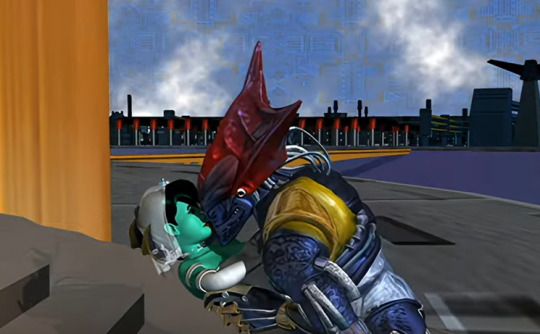
(There's also the complicated issue of Dot's mental health playing a big part which I shan't even get started on, I'll never stop.)
In truth what Megabyte does is sell Dot "Megabyte-in-disguise", hidden beneath Bob's shell. That's all. He's not very much Bob at all when you really watch it.
Is that what she wants? Megabyte? No. His morals, his values - the sheer fact he has set up what is incontravertably and terrifyingly a rape plot - are all a complete anathema to her. And yet we are reminded that they are similar and that in those similarities there is an element of concordance, of mutuality, separated by stark morality. That they can appreciate one another and are alike one another. And it is in that sparse ground that I plant my fanfic seeds and make them germinate because, though the chance is slim, I can make that notion sprout roots. There is a twisted parallel universe where they could be together and, though they would never be a peaceful match of concordance and romance, that pair of control freaks would be electrifying; it would be a relationship which would be a constant battle of one-up-man-ship, of power, dominance and control. Get out the whips and chains, they're here for it. How can one not to tempted by the sordid notion of such a match? They wouldn't make love, they'd make fire, bitches.
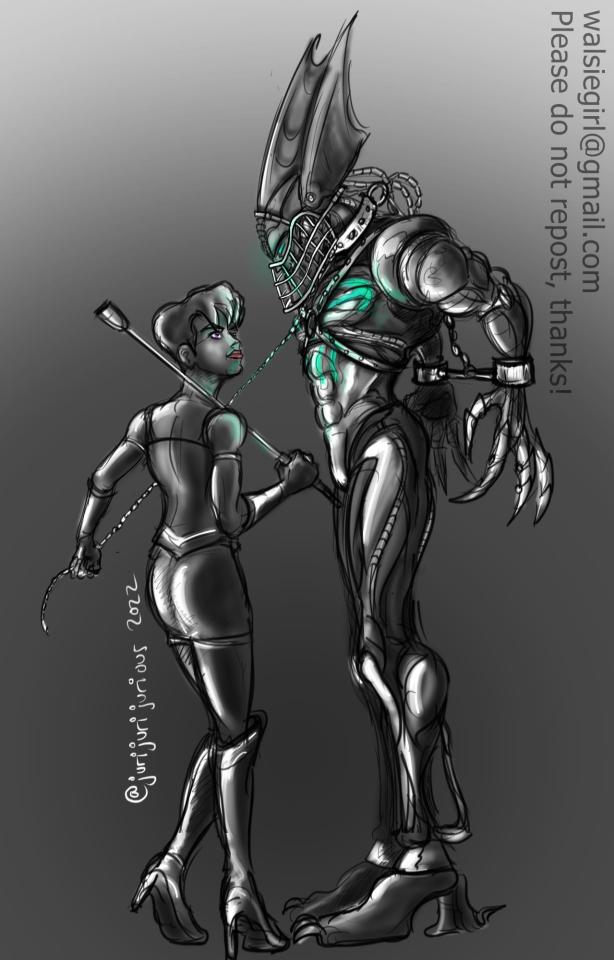
And on that note: Like a firewaaaallll...
Thanks for the ask, I loved this. I I hope that's helped? I don't even know if it makes sense. If not I've at the least I've given you an insight into my brain. Stay frosty!
#reboot#juri got an ask#reboot fanart#reboot fanfic#inane rambles#megabyte#trojan megabyte#dot matrix#megadot#megabyte x dot#bob (reboot)#reboot cartoon#reboot tv show#control freaks
15 notes
·
View notes
Note
Is it possible to use the symbolic states framework to interpret the motivations and emotions of celebrity worship cults or anything of that nature?
I've been thinking about this post on-and-off for some time now, and I'm going to attempt to answer it here.
I readily admit that this is all just theorising; I've extrapolated outwards the harmful nature of symbolic states based on my own experience, but I find myself struggling at where to draw the line between where something is simply 'fantasising', 'narrative/meaning-making' etc. and a full-on symbolic state, let alone where that state becomes actively dangerous for the psyche's relationship with cause-and-effect. I know religious people who have a frankly much better relationship with causality than I did.
I percieve symbolic states to be more of a symptom; an end-point of various psychological drives, rather than something as an origin point for disfunctional thinking.
I think celebrity-worship cults come from a place of dehumanisation and narrative-making that is necessarily symbolic - we as humans process the world from a top-down approach, meaning that we make a rapid assessment of the nature of something without needing to know it in full. The best example is seeing a dark blob on the ground in the dark; first you think it might be a cat, then a discarded bag, then a cat again, until you get close to it and can confirm that it is, indeed, a bag. This is a necessary survival mechanism; the 'bigger picture' must be identified as soon as possible, whereas needing to get all the details first will leave you vulnerable to being eaten. So we tend to percieve in shorthand; and all our thinking is based around this. This 'shorthand' becomes the symbols.
In the case of celebrity, we don't need to know everything about the person to feel close to them; there are enough aspects of them - their clothes, their attitude, the things the say about their life, their sense of humour etc. etc. - that we can use as symbols to make a picture of them that we can be attached to. And humans are highly motivated - our motivations warp our perceptions massively in favour of what we want to believe. So if that celebrity likes to drown puppies in their spare time, if we're motivated enough, we can either forget that detail or decide that we're actually pro-drowing puppies as well. That way the 'symbol' of drowning puppies now takes on new meaning.
So from all this I take that calling things 'symbols' is just my own fancy way of describing phenomena that have already been fully linguistically covered by other areas of psychology. Where I go a step further is to document the point where the symbols become more important on a deep psychological level than any aspect of reality itself, and how this can be harmful.
This was a very interesting question, anon, thank you - you really got me thinking about it.
6 notes
·
View notes
Text
A puppet and it’s master: Barnaby and Maverick
Look at me, I’m here again psychoanalyzing Tiger and Bunny and their subsequent Daddy Issues and Hero worshipping problems. Sorry. Not really. But sorry. Strap in cause this is a long one.
There is something really interesting about their relationship and the way Maverick just... throws Barnaby away in the last episodes of season 1, and the way Barnaby (in season 2) still keeps a photo of himself and Maverick.
In season 1, Barnaby, to Maverick, is a well-conditioned pet.
When you have the power to change the very essence of a human being, pick out the parts that are unnecessary and add things that are, they all become dolls after a while. That's why he was able to let go of Barnaby so quickly. He never saw him as human, just another puppet.
Maverick relies on subtlety. Barnaby already had a vague framework of a loving household, so to go against that outwardly would put his conditioning in jeopardy. He uses his powers as a last resort. And he's conditioned Barnaby well enough for him to move out, go to the Hero Academy, and talk to other people. To live a semi-regular adult life (other than the fact that his penthouse is a gift from Maverick and his paycheck is also Maverick’s to give). Because he still has that emotional collar fastened around Barnaby's neck. He doesn't need to choke him with it, all he needs to do is tug on the leash, and Barnaby comes running.
He's given Barnaby just enough autonomy to believe that he, himself is somehow defective and broken, not Maverick's methods. It keeps him compliant and distracted, and leaves Barnaby trusting the reality Maverick had inflicted upon him at a young age.
Regarding Barnaby's relationship with Maverick. It definitely falls more under the lines of emotional abuse. In regards to season 1, I think there is a part of Barnaby that wants to move on, to live normally, but his need for revenge overweighs every other want or need.
He's been taught that love, at least with Maverick, is conditional. It's about what he can do for him, how he can repay him, how to make him proud, and how he can make Maverick's show look good. Then, and only then, will he receive a modicum of affection back. This is exemplified in the way that after Jake is dead, and Barnaby thinks that he’s gotten his revenge does he pivot to another goal; making Maverick proud.
I know some people have theorized that this was another bout of brain-washing, but I don’t think it is. I think Maverick’s choices and Barnaby’s have blurred to the point where there is no need for obtrusive brain-washing when Barnaby is already conditioned enough to act out Maverick’s desired response with nothing but a couple of kind words. That makes their relationship even more insidious because now, us, as the viewer, call into question Barnaby’s free will. How much of this was his own decision? What is a puppet without its strings? What happens next?
He's grown up with that mindset since he was 3, and his relationships with other people reinforce that preconceived notion of love. That as long as he's charming, well-spoken and good-looking people will love him. As long as he exemplifies perfection there is nothing he can’t do except the things he wants to do the most; kill his parents’ murderers. He was the Hero Academy’s star, the King of Heroes, and overall a squeaky clean and charming image, and it has gotten him far in life. I wouldn't say that he consciously understands that that is what he's doing, and he doesn't necessarily obsess over public opinion (although he does bask in the glory lol). It's just something that has been a constant in his life other than revenge.
Also... how Barnaby keeps a picture of him and Maverick of the say he debuted as a hero on his table. I hope we get to see more of Barnaby’s internal struggle in the second part of season 2. I won’t speak on that yet because there’s not a lot of evidence to make a full post out of it, but the implications are WILD.
#tiger & bunny#Barnaby Brooks Jr#tiger and bunny#tiger and bunny meta#Mr. Maverick slander is encouraged#Much less rambling and more psychoanalyzing a fictional pretty boy#meta#tnb#i just think he's neat#meta is just another word for daddy issues
59 notes
·
View notes